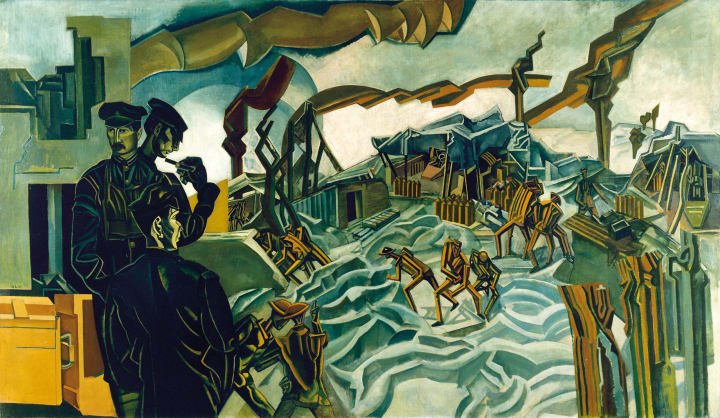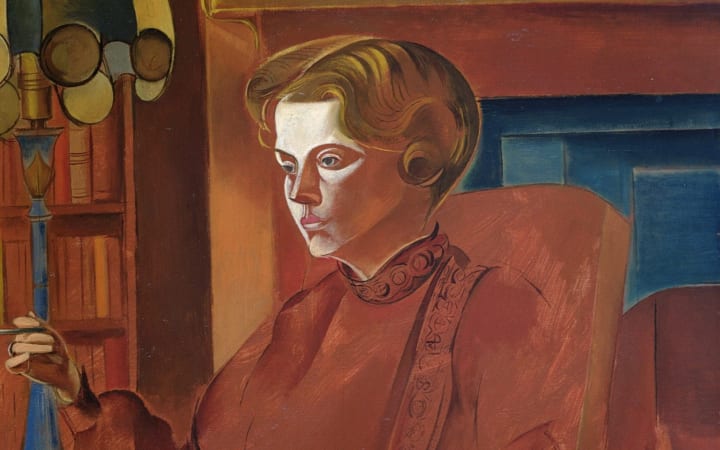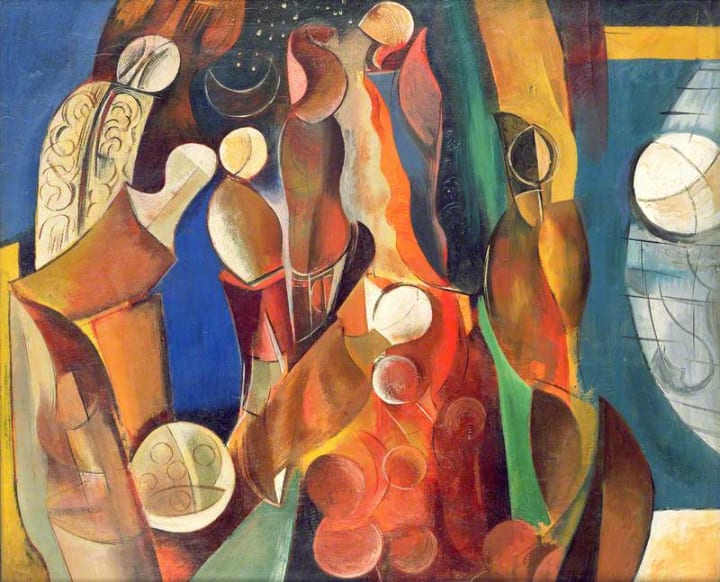“The Revenge for Love” by Wyndham Lewis
First Impressions (Pt.4)

Wyndham Lewis’ “The Revenge for Love” is set in the days of the Spanish Civil War and stars a cast of characters who each have damning secrets, each of them fail to fit in with the rest and they each have some sort of Shakespearean Fatal Flaw that seeks to eat them up from the inside. The book bases itself on the deception of feelings, face, situations and the manipulations of power that are, in most ways, typical of a machiavellian character. Especially where the protagonist, Percy, is concerned - he goes as far as calling Machiavelli’s “The Prince” the book with the most truth ever written. Throughout the novel, masks and deceits play out as complex tensions between various characters and foremost, we have the fact that the protagonist is in jail. From this, the reader is spun off into a turmoil that threatens every character that has dared to become involved with him at all. Whilst the war becomes a political wave of destruction, the characters fail to keep up with the Spanish when it comes to revolution as fast as physically possible. The non-Spanish characters fail to also meet the standards required and find themselves lying even about their own identities to appear to be all on the same side. It is this that leads the reader to the end of the novel and yet, there is no real ending at all.

The main theme in this book is most definitely falsehood and deceit. The first taste of this that we actually get is through the identification of freedom. This is not only ironic seeing as we are sitting in the wake of the Spanish Civil War and the run-up to the Second World War, but it is also ironic because the identification of freedom quotations are mostly set inside a prison cell and are said mostly by the prisoners themselves:
“We are never free to choose - because we are only free once in our lives…That is when we gaze into the bottom of the heart of our beloved and find that it is false - like everything else in the world!” (p.7)
Through this quotation it is clearly seen that there is absolutely no requirement for these political prisoners to be released in their own eyes. This almost Rousseauvian philosophy has them trapped into a life they did not choose in a place they do not want to be. Therefore, deleting one of them would throw them back into the turmoil of their own lives. Their own reasoning therefore, is essentially that they would rather be under the structured prison life than the unstructured life of the outside in which they could die at any moment. This most likely means that the prisoner would find some sort of solace with being in prison during the war that is going on outside of it.

This leads on to the next point as the Rousseauvian philosophy stated by the prisoner is not only a statement of how life is deceptive in its decisions for the individual and how these keep man confined to either a life of servitude or a cell (if they are lucky). This is directly reflected back on to the political position of the state in which the human chains are more apparent and the reader gets a sense of how the Revolution is playing out for the people involved in it.
“The Social Revolution would be there once more, in place of the static, make-believe and seductive depictions of the objective universe. Thank God for the good old subjective world!” (p.46)
This does not only show the reader that the revolution in Spain is not going as according to plan but it also shows the reader why. If we take the Rousseauvian philosophy of man feeling as if he is not free until love declines from the first part, we can honestly see that it is emotion - or subjectivity - that is keeping these people within their confinements. As Percy states that the objective universe is ‘make-believe’. He not only shows that through this war, factual events practically do not exist, but that it is difficult to determine the truth from a life that is so unpredictable in its movement between human freedom and human confinement. All in all, we have the subjectivity, which is the one thing that revolution enjoys talking about - but has no facts. It allows the revolution to happen but traps people like Percy, in prison. We then have the objectivity which is impossible to determine since both sides are biased equally towards their own cause and thus, the objective universe cannot exist. The Rousseauvian philosophy therefore has three sides: one where man is on the outside, fighting and waiting to die. The next where man is inside a cell but is technically not in as much forced danger. And then there’s the third in which man is encompassed by ideology and bought and sold via the word. They are all as biased as each other - no matter which pretence they are supporting.

The next piece of deceit in the novel is to do with names. The first aspect of this that we get is when Percy and another man are discussing that neither of them actually use their real names. The man states that he uses a name he gave to himself out of shame over the occupation of his own mother whereas, Percy states that his last name is one he made up. Whether Percy makes up his last name or whether this is used as a ‘one-up’ on the other character (and therefore, a double deceit) is unclear. But, it is clear that this returns later on in the novel again and again in which characters rename themselves based on either who others think they are or who they would prefer to be if not themselves. This, in turn, gives some of them a false sense of personality. For example: in the case of ‘Jack’ Cruze:
“John Cruze was known as ‘Jack’ to everybody, much as Falstaff is in Shakespeare’s pages; and ‘Jack’ he was to himself as well. Or it would be better to say that he had always thought of himself as ‘Jack’, others did the same.” (p.95)
Not only does this show again what has actually happened but it also gives the reader a sense of how it all happened. Initially, we have the fact that John Cruze is called ‘Jack’ by various other people. Then we have the fact that he has always thought of himself as ‘Jack’. Finally, we get the question of how this changed his personality and why. We have been given a feeling through the way in which it is uncertain of when exactly that name came around, of what the difference between John Cruze and Jack actually is. Further on the reader will see that John Cruze is a man suppressing violence and hatred whereas, Jack, is a man in love with another man’s wife. A passionate and rather obsessive and hyper-possessive man. It is rather ironic that it is Jack that says “the quickness of the hand deceives the eye!” (p.146) halfway through the book as it is also Jack’s own ‘quickness’ that deceives a woman he truly cares about by showing his own true nature - that woman is Gillian.

But the biggest piece of deceit in the whole text is the one performed by the main character, Percy, halfway through the text. This is when Percy decides to reveal to the other character involved what exactly he is doing in terms of being a political prisoner. It is this time that he states he is “turning (himself) into a first-class piece of propaganda.” (p.208) Doing this means that Percy already knows about all the deceptions on the part of the political parties that he is talking about. He rightfully accuses both sides of the war of political bias, manipulation, machiavellian war games and, tactics that are primarily there to make the other side appear incompetent. Percy makes a great speech on the same page about how he is not a ‘hero’ and how he is actually feeding this propaganda device in order to see how much people will believe. He is also deceiving the very thought of himself being killed or being denied basic human needs. Percy is one giant show of entertainment throughout the book, representing the downfall and naiveness of Britain in a time that is practically brimming into the most violent war in modern history.
In conclusion, there are a great many types of deception, but I believe that the best deception in the entire book is the deception of love. Performed by the likes of Gillian towards Jack and others within the book. It also has characters talking about a ‘false bottom’ as if there is something in a bag or a room in which they are standing. This is not only a direct correlation to what is happening in the country at the time, something the British cannot understand. But it also makes great use of this falseness for the character to address their own problem and thus, lead them to make better choices than one where they go out purely to become locked in prison again.
About the Creator
Annie Kapur
200K+ Reads on Vocal.
Secondary English Teacher & Lecturer
🎓Literature & Writing (B.A)
🎓Film & Writing (M.A)
🎓Secondary English Education (PgDipEd) (QTS)
📍Birmingham, UK
X: @AnnieWithBooks
Enjoyed the story? Support the Creator.
Subscribe for free to receive all their stories in your feed. You could also pledge your support or give them a one-off tip, letting them know you appreciate their work.






Comments
There are no comments for this story
Be the first to respond and start the conversation.